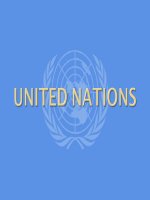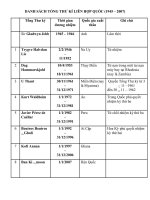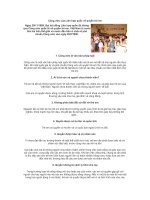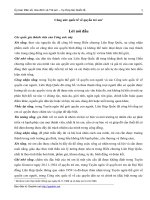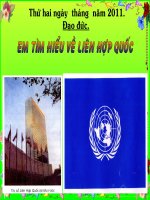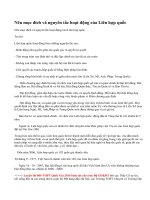United Nation (Liên hợp quốc)
Bạn đang xem bản rút gọn của tài liệu. Xem và tải ngay bản đầy đủ của tài liệu tại đây (2.84 MB, 40 trang )
The United Nations was founded as
a successor to the League of
Nations, which was widely
considered to have been ineffective
in its role as an international
governing body, in that it had been
unable to prevent World War II.
Some argue that the UN's major
advantage over the League of
Nations is its ability to maintain and
deploy its member nations' armed
forces as peace keepers. Others
see such "peace keeping" as a
euphemism for war and domination
of weak and poor countries by the
wealthy and powerful nations of the
world.
The term "United Nations" (which
appears in stanza 35 of Canto III of
Byron's Childe Harold's Pilgrimage)
was decided by Franklin D.
Roosevelt and Winston Churchill
during World War II, to refer to the
Allies. Its first formal use was in the
1 January 1942 Declaration by the
United Nations, which committed
the Allies to the principles of the
Atlantic Charter and pledged them
not to seek a separate peace with
the Axis powers. Thereafter, the
Allies used the term "United
Nations Fighting Forces" to refer to
their alliance.
The idea for the UN was espoused in
declarations signed at the wartime
Allied conferences in Moscow, Cairo,
and Tehran in 1943 . From August to
October 1944, representatives of
France, the Republic of China, the
United Kingdom, the United States, and
the Soviet Union met to elaborate the
plans at the Dumbarton Oaks Estate in
Washington, DC. Those and later talks
produced proposals outlining the
purposes of the organization, its
membership and organs, and
arrangements to maintain international
peace and security and international
economic and social cooperation.
On 25 April 1945, the UN
Conference on International
Organizations began in San
Francisco. In addition to the
governments, a number of non-
governmental organizations were
invited to assist in drafting the
charter. The 50 nations represented
at the conference signed the
Charter of the United Nations two
months later on 26 June. Poland
had not been represented at the
conference, but a place had been
reserved for it among the original
signatories, and it added its name
later.
The UN came into existence on 24
October 1945, after the Charter had been
ratified by the five permanent members
of the UN Security Council—the Republic
of China, France, the Soviet Union, the
United Kingdom, and the United States—
and by a majority of the other 46
signatories. That these countries are the
permanent members of the Security
Council, and have veto power on any
Security Council resolution, reflects that
they are the main victors of World War II
or their successor states: the People's
Republic of China replaced the Republic
of China in 1971 and Russia replaced the
Soviet Union in 1991.
With the addition of Montenegro on 28 June 2006, there are
192 United Nations member states, including virtually all
internationally-recognized independent states
The United Nations Charter outlines the rules for membership:
1. Membership in the United Nations is open to all other peace-
loving states which accept the obligations contained in the present
Charter and, in the judgment of the Organization, are able and
willing to carry out these obligations.
2. The admission of any such state to membership in the United
Nations will be effected by a decision of the General Assembly upon
the recommendation of the Security Council.
2. The admission of any such state to membership in the United
Nations will be effected by a decision of the General Assembly upon
the recommendation of the Security Council.
The Group of 77 at the UN is a loose coalition of developing nations,
designed to promote its members' collective economic interests and
create an enhanced joint negotiating capacity in the United Nations.
There were 77 founding members of the organization, but the
organization has since expanded to 130 member countries.
The group was founded on 15 June 1964 by the "Joint Declaration
of the Seventy-Seven Countries" issued at the United Nations
Conference on Trade and Development (UNCTAD)
The UN has six official languages: Arabic, Chinese, English,
French, Russian and Spanish
Arabi
c
Chines
e
Spanish
English
Russia
n
French
Five of the official languages were chosen when the UN was
founded (the languages of the permanent members of the
Security Council, plus Spanish, which was the official language
of the largest number of nations at the time).
Arabi
c
Chines
e
Spanish
English
Russia
n
French
Arabic was added in 1973; the number of Arabic-speaking
member states had increased substantially since 1945, and the
1973 oil crisis provided the catalyst for the addition.
Arabi
c
Chines
e
Spanish
English
Russia
n
French
